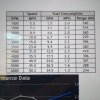I’m thinking hull design, boat weight and propeller application (three blade? Four blade? Pitched for speed? Pitched for cruise?) play a huge part in this discussion. I just transitioned from a 24 foot boat (Skagit Orca) with a Suzuki DF300 single engine to a 26 foot Seasport hung with twin DF200’s. All my previous boats were singles—-this is my first boat with twins.
The lean-burn Suzuki’s are very fuel efficient but I was leaning forward in my chair to see how the fuel burn of my Seasport (10,000 lbs) with twins would compare with the Orca (9,000 lbs) with the single.
This chart was taken from the Seasport brochure for the 26 foot Kodiak. The performance numbers were generated from my boat ( it was a SEasport demo boat before I purchased it) and I have since more or less duplicated those numbers running it myself (up to 4,000 RPMS; once I get more comfortable with the servo-motor actuated ZipWake tabs I might flirt with WOT but I haven’t done that yet)

So, I can say anecdotally that these performance numbers are VERY similar to the fuel burn I saw when running my Skagit Orca with the big single. The difference: with twins, the Seasport gets more speed at lower RPM for same fuel burn. (Really)
However......Most of my Orca experience was with a HUGE 4-blade (16” PowerTech) It was a great prop for cruise but the weight of that prop was significant. It was normal to run 3,700 at approx. 18 MPH with fuel burn at 10 GPH. Compare that to 3,500 RPM in the Seasport with twins—the same 10 GPH, but a bit higher speed...
I should add, though—most of my fuel burn numbers with the Orca were when I was running very heavy—-multiple coolers of salt ice, 600 liters of gas, supplies for a 3 week trip. And speaking of propellers: I hit a rock in Shearwater last summer and punched the PowerTech in the nose. I took it off and replaced it with a Suzuki 16x18.5” spare. The first thing I noticed with the 3 blade ——approx. 8- - 10% better fuel economy! I was floored at the difference between a 3 blade and a 4 blade
So it’s not an exact science comparing singles to twins. I only bought a boat with twins because it is almost impossible to find 25 foot + boats with singles these days, at least in my neighborhood. I lurked for a year looking for the right boat; all I saw were twins, twins, and more twins. The closest I came to finding the right boat was a 27 foot Skagit Orca up in Prince George last October ....but...... it had a Yamaha F350 on it—-that was a deal breaker for me
If I’d decided to build a boat and hang a duo prop DF350 on it (which was my original plan) the wait time would have been 6 months to a year
So I grabbed a boat with twins because it was available and I didn’t want to wait. So far, with those fuel burn numbers, I’m happy I stuck with the Suzuki brand when going to twins, though I’ll admit, the 2.3 MPG mentioned in conjunction with the 4,000 RPM has been elusive for me.
Best I’ve done is 2.2 , though I’m running with approx. 40% more fuel in the tank then there was when this performance sheet was generated


